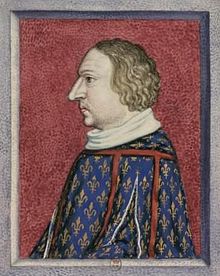Louis I of Anjou
| Louis I | |
|---|---|

15th-century portrait of Louis
|
|
| Duke of Anjou | |
| Reign | 1360–1384 |
| Successor | Louis II |
| Born |
23 July 1339 Château de Vincennes |
| Died | 20 September 1384 (aged 45) Bisceglie |
| Spouse | Marie of Blois |
| Issue |
Louis II of Naples Charles, Prince of Taranto |
| House | Valois-Anjou |
| Father | John II of France |
| Mother | Bonne of Bohemia |
Louis I (23 July 1339 – 20 September 1384) was the second son of John II of France and the founder of the Angevin branch of the French royal house. Bonne of Bohemia gave birth to him at the Château de Vincennes. His father appointed him Count of Anjou and Count of Maine in 1356, and then raised him to the title Duke of Anjou in 1360 and Duke of Touraine in 1370.
In 1382, as the adopted son of Joan I, he succeeded to the counties of Provence and Forcalquier. He also inherited from her a claim to the kingdoms of Naples and Jerusalem. He was already a veteran of the Hundred Years' War against the English when he led an army into Italy to claim his Neapolitan inheritance. He died on the march and his claims and titles fell to his son and namesake, Louis II, who succeeding in ruling Naples for a time.
Louis was present at the Battle of Poitiers (1356), in the battalion commanded by his brother Charles, the Dauphin. They hardly fought and the whole group escaped in the middle of the confrontation. Although humiliating, their flight allowed them to avoid capture by the English, who won the battle decisively. King John II and Louis' younger brother Philip were not so fortunate and were captured by the English, commanded by Edward, the Black Prince. Their ransom and peace conditions between France and England were agreed in the Treaty of Brétigny, signed in 1360. Amongst the complicated items of the treaty was a clause that determined the surrender of 40 high-born hostages as guarantee for the payment of the king's ransom. Louis, already Duke of Anjou, was in this group and sailed to England in October 1360. However, France was not in good economic condition and further installments of the debt were delayed. As consequence, Louis was in English custody for much more than the expected six months. He tried to negotiate his freedom in a private negotiation with Edward III of England and, when this failed, decided to escape. On his return to France, he met his father's disapproval for his unknightly behavior. John II considered himself dishonored and this, combined with the fact that his ransom payments agreed to in the Treaty of Brétigny were in arrears, caused John to return to captivity in England to redeem his honor.
...
Wikipedia
